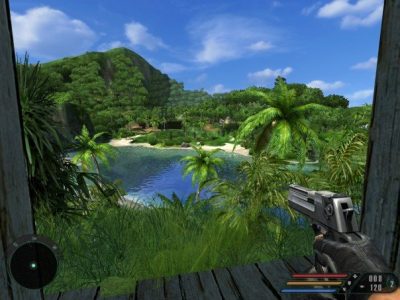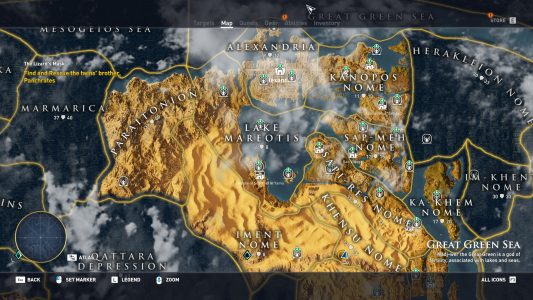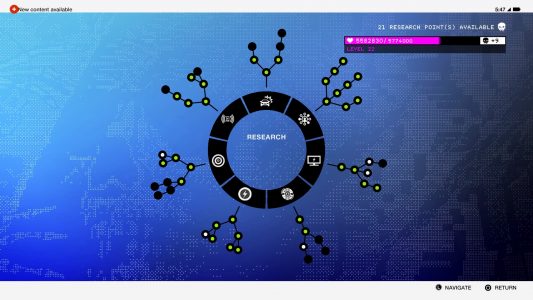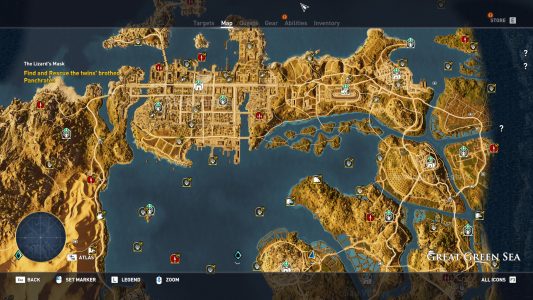Ubisoft Open World Funny Image Bacteria
I picked up Assassin's Creed: Origins a few weeks ago, and originally intended for this article to be a review of the game, but the more I delved into the meat of the title, the more I felt drawn to write about something else.
AC: Origins is a good game, though much of it is painstakingly familiar . The addition of RPG elements to the combat system is a welcome shift from previous titles in the series, but feels like more of an afterthought than an earnest rework. But all of that is secondary compared to what was most recognizable: the open world.
In the beginning

Far Cry is the game that introduced me to high-fidelity PC gaming. Before that, I made do with integrated graphics, which had been more than enough to power titles like Call of Duty.
But Far Cry was the sole reason I purchased a GeForce 6200.
At this point, I was already well acquainted with open world games. It had only been a year since Morrowind blew my mind with the amount of agency it gave players (interestingly enough, Ubisoft handled the European distribution of the game). Of course, open world games had been available for decades before TESIII, but none had ever done it as stylishly.
Far Cry was different. Up to this point, no shooter I had ever played offered as much leeway when moving from one objective to another. Constricting corridors were replaced by an island paradise with miles of breathing room.
This, however, was just the beginning…
Room to Grow
In 2007, Ubisoft made a significant addition to its portfolio in the form of Assassin's Creed. Set during the crusades, the game featured dense middle eastern cities connected by a narrow network of canyons. Players were given free roam, but the open world felt controlled – far less robust than TES: Oblivion (released the year before).
Ubisoft followed up with Far Cry 2 in 2008. But, this time, the game eschewed the tropical paradise from the first game, adopting a new storyline and locale – Africa. The game featured two separate maps, each with a massive expanse of land to explore – and create chaos in.
From this point forward, Assassin's Creed and Far Cry forged separate, but parallel, paths.
All for one
As time progressed, however, the sequels to these franchises began to look more and more similar, even while remaining representative of their respective genres. To many, Far Cry III and IV felt nearly identical. And the flood of Assassin's Creed games became indistinguishable from one another. Add into this the disappointing debut of Watch Dogs in 2014, and things weren't looking too good for Ubisoft.
Assassin's Creed: Syndicate felt like the straw that broke the camel's back.
Following its release, Ubisoft announced that it would be taking a one year break from Assassin's Creed, supposedly to get the series back on track. But, at that time, it felt like a lot of their open world games needed some TLC, as many of them were being pegged as stagnant.
So…Ubisoft took a break.
The New (formulaic) Hotness
Everything changed at the end of 2016. Watch Dogs 2 was a new leaf for the series. It maintained the spirit of the first game, but presented it in a way that was far more whimsical. The gritty Chicago underground was replaced by the colorful San Francisco bay area, and a litany of things to do that matched the locale. To a degree, Watch Dogs 2 felt like a testing ground for a lot of new ideas. As it turned out, some of these ideas would form the basis of what I came to recognize as Ubisoft's new open world formula.
In 2017, the trend continued as Ghost Recon Wildlands and Assassin's Creed: Origins utilized many of the same systems.
Drones
I first encountered the use of drones in Ghost Recon Wildlands, but was surprised to find that Ubisoft originally implemented the feature in Watch Dogs 2 (these games released within a few months of one another, so it's safe to say that the feature was likely built into both games at the same time). Basically, the drone gives players the ability to survey an area and mark enemies before combat begins. Assassin's Creed: Origins even has a similar feature in Senu, the main character's ubiquitous eagle that's always circling overhead.
Regions

Regions have, perhaps, become the defining feature of Ubisoft's open world games. Though part of one contiguous world, regions almost act as levels. Divided by difficulty, they guide the player along a general path, while allowing them a modicum of freedom to explore on their own. It's an interesting design choice that (mostly) works. But, after a while, the similarities between regions makes them seem somewhat repetitive.
Though geography may vary depending on the locale, the available activities in each region never change. Strongholds containing enemies and objectives (collectibles or quest items) are the staple of each region, though there are also opportunities to collect loot and unlock fast travel locations. Either way, completing one area gives you a decent idea of what every area in the game will have to offer.
Skill Tree

This isn't something exclusive to Ubisoft, and perhaps it's a criticism of the genre as a whole, but every game in their open world portfolio handles leveling up via a painfully generic skill tree. Each share so much in common that it's almost possible to go from one game to another without knowing you've actually changed games. There's something to be said for "tried and true", but too much of a good thing veers towards mundane.
Same same, but different, but still same
It would be fairly easy to prattle off a list of other games that utilize similar systems in an open world. But…the most important thing to note is how , and how broadly , Ubisoft is implementing these systems.
Take Bethesda, for instance. The game company that we all know and love has developed a formula that they implement in two very successful series: The Elder Scrolls and Fallout.
Ubisoft, on the other hand, has normalized their open world formula across as many of their games as they possibly can. Assassin's Creed, Ghost Recon, The Crew, Far Cry, Watch Dogs, and even Splinter Cell have all, in part, felt the influence of this developing formula – and to great success.
Baser Elements
But there is a catch.
While Ubisoft has mastered the art of building worlds and filling them with stuff to do, the formula they use winds up being acutely double-edged. In the past, Ubisoft games have had a greater focus on story; and while there were still satellite objectives and activities to perform, they didn't comprise the bulk of the gameplay. Now, however, sightseeing and NPC problem-solving heavily outweighs the pull of the main story, and this means that there is a lot to do. Perhaps too much.
In a game like Skyrim, exploration is the impetus that keeps the player engaged. Every little nook and cranny of the game world is filled with things to find, which means that poking a nose into even the most remote corners of the map will likely reward the player in some way. This type of exploration is organic. It embodies freedom by creating adventures that the player didn't expect or intend.
But when the map is filled with predetermined markers, this kind of gameplay becomes rote; exploration is replaced by repetition, and discovery is limited.
Objective Overload

That's the biggest drawback of Ubisoft's current open world formula.
While I've thoroughly enjoyed Ubisoft games over the years, I've found myself struggling more and more to "finish" the ones that decentralize story. And, lately, that's been all of them .
For instance, my wife and I played Wildlands together. It was lots of fun, but after countless hours of wiping out cartel members, we lost interest. It's been almost a year now, and we still talk about finishing the game, but the chances of that happening are low. More recently, I had to force myself to finish Assassin's Creed: Syndicate (before I could buy Origins). I sunk many hours into that game, mostly in pursuit of secondary objectives and "clearing" areas of the map. Like in other Ubisoft games, I burned out after a while.
This isn't to say that Ubisoft games are bad , per se, but when the worlds are designed with too much hand-holding built in, it can take away the player's desire to be thorough. When everything is already marked on the map, whether discovered or not, the drive to explore is stripped away. There is no curtain to peek behind. Everything is already laid bare.
This is, perhaps, what disappoints me most.
I revel in exploration when I play games. The first time wandering off the beaten path, regardless of the title, is magical. I'll always remember the first time I rode away from the ranch in Red Dead Redemption, into the western wilderness, and I'll always cherish the first time I bypassed Whiterun to discover the great white north of Skyrim.
These experiences weren't defined by a series of question marks on a map, but by unbridled discovery. Everything I found, every quest I completed, was stumbled upon – a result of earnest interest in the world around me.
Ubisoft has definitely nailed down the art of crafting beautiful worlds, but the normalization of gameplay between them remains a stumbling block. While some features are a boon to the player, others diminish what sets these different worlds apart from one another. That, alone, could be enough to damage the longevity, and novelty, of each series.
The Beaten Path
The bottom line is that, while Ubisoft's refinement of their open world formula will be polarizing to some, they're tailoring their experiences in such a way that will, ultimately, appeal to a wider base. The hand-holding, while irksome, ensures that players interested in experiencing as much of the game as possible can do so without aimlessly exploring every inch of the world. And it allows more casual players without an abundance of time to consume the game in more manageable chunks.
Even I've noticed that my time with Assassin's Creed: Origins is spent in handfuls of minutes, rather than concentrated hours. Frankly, I'm okay with that. The fact that I'm able to drop in and out of the game so easily without losing progress, or being truly "lost" in the world, allows me to take my time, or focus it elsewhere, without detriment to the experience.
It's liberating .
At the end of the day, I'll always have niggling complaints about the direction Ubisoft has taken its open world games. By streamlining the experience, they've stripped away some of the magic. Even so, there's still plenty to be had. You just don't have to look for it as hard.
Source: https://imperium.news/ubisoft-open-world-formula/
0 Response to "Ubisoft Open World Funny Image Bacteria"
Post a Comment